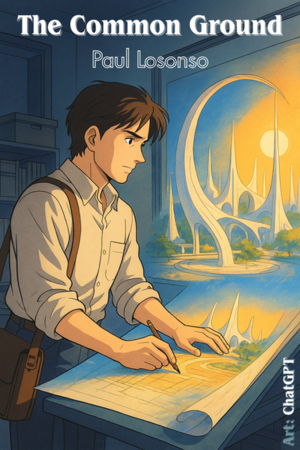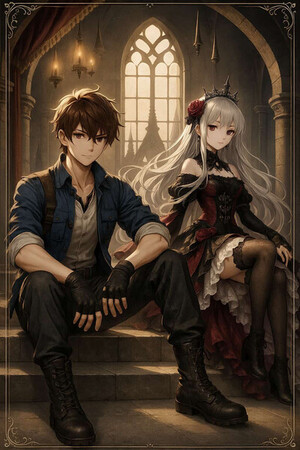Chapter 34:
Little Tom Hart
The Common Ground
Bard’s voice rang out from behind him, sharp and insistent. “I also have a question!” He shouted over the press of people. “How could you let things get so out of hand?!”
A hush slammed down upon the onlookers. The sound was like a thousand breaths drawn in at once.
“Can he speak to the Warden like that?” Fawks whispered to Cecile. But she only kept her eyes fixed, troubled, on the exchange.
The Warden rode on, deliberately ignoring Bard.
“If you hadn’t taxed the weakest so heavily,” Bard continued, undaunted, “if instead you had pushed them to imagine, to create more – none of them would ever have become shades!”
“Shut it!” someone jeered from atop the walls.
The Warden seemed ready to spur his horse into the pass ahead. Already his army had reached the narrow gap between the mountains moving Varnwards from the city. The valley stretched downward and away – Eliowards.
But Bard refused to stop. “The Outskirts would never have overflowed with shades, growing more unstable by the day! Their people wouldn’t have abandoned them for the safety of the great cities!”
“Will someone silence him?!” voices cried. The crowd began to stir restlessly, teeth clenched against Bard’s accusations. Still, he pressed on.
“The ones who came here, most of them gained nothing! And in the end, they went back as shades. And now – you go to finish them!”
That was it.
If Bard had sought to draw the Warden’s attention, he had succeeded.
The Warden snapped. Instead of galloping toward the pass, he wheeled his horse and charged straight at Bard. The young man took a single step back but held his ground. Those from the crowd who were close recoiled in shock – some stumbled away, a collective gasp tore through the Foregate like a sudden wind. Then they fell utterly still.
“You haven’t the faintest idea what it takes–every single moment–to sustain a world like this!” the Warden thundered, his face flushed. “Do you think a single man can hold up the weight of creation? That such a place could exist without every hand giving back something? How could I not tax?”
Elias’s stomach knotted–was this courage from Bard, or sheer madness? The air between them felt like dry tinder, waiting for a spark.
“Those you defend were always consumers–drainers! They lived here at the expense of everyone else who created. Never did they imagine. Never did they contribute to their neighbor. Not once.”
But Bard’s eyes blazed with defiance. “I’ve seen many turn. I’ve seen them learn, from scratch, how to be useful–”
The Warden spoke over him, unrelenting. “I owe no one an explanation of how I run things! And if you believe you could do it better – you are welcome to come and try. But you can’t.” His voice dropped, low and almost bitter. “You can’t…”
Elias saw something then – something almost sorrowful in the Warden’s face. He looked weary. World-weary. As if he wished they could take the burden from him. As if he longed not to be the one holding everything together, alone.
And though everything Bard had accused him of sounded true, nothing the Warden had said gave the impression of a heartless tyrant. If anything, he seemed both exhausted and cornered.
But what came next deeply disturbed Elias.
“As long as you live under my roof,” the Warden said to Bard, voice heavy with threat, “you will abide by my rules.”
That was it. Elias had had enough.
Almost instantly, his eyes blazed deep green – for the first time. He stretched out his arms, his whole posture opening wide like the Vitruvian Man, and began to create out of nothing a rising sphere around his three companions and the Warden. It lifted slightly above the ground, and within it a sunlit plaza formed beneath their feet, ringed with white curved spires. Then the vision spread outward in every direction, unfurling into the beginnings of a vast city – taking shape right there before the bare eyes of the gathered crowd.
On one side, almost as an afterthought, an archway shimmered into being. It opened into somewhere unseen, and for the briefest moment a breeze slipped through, carrying the sound of children’s laughter.
“Watch yourself!” the Warden warned sharply.
At first, everything unfolded exactly as Elias had pictured it. Heavy, yes – but astonishingly, still controllable.
Then they came – too many. People who seemed to drain far more imagination than they ever gave back, many already halfway to becoming shades, surged forward. Like moths to a flame, they clawed their way toward the sphere, scrambling inside even as it was still forming.
The drain was unbearable. Elias could no longer hold it together. The structure collapsed, dropping them all hard onto the earth. A choking cloud of dust rose from the rubble.
Elias coughed, gasping for air. His chest heaved; the dust burned his throat.
“Impressive,” admitted the Warden from atop his horse. “But you almost died.”
Fawks rushed to him, dropping to his knees. “Are you alright?”
The Warden’s gaze lingered on him. “Because I see your potential, I shall let you roam freely – free of all tax.”
Fawks glanced sideways at Bard and Cecile. “Does he mean us too?” he whispered.
“I cannot know if I’ll return,” the Warden said at last. “But whatever happens, Orrendale must not fall!” His words thundered, and he spurred his horse toward Dravenholt. The people erupted in cheers – they had heard Orrendale cannot fall as a triumphant promise, not as a grim necessity.
Bard and Cecile drew close to Elias, who was still on his hands and knees, drenched in sweat and struggling for breath.
“That was amazing!” Cecile whispered.
Time passed. The dust settled. Most of the crowd had already drifted back to their tasks – even those who had just been thrown from Elias’s collapsing creation. Elias pushed himself up a little, though still on his knees, tears drying faintly at the corners of his eyes.
“To be honest,” he admitted hoarsely, “I thought what I just did might kill me… but I did it anyway.”
No one spoke. They only listened. Elias remained there, heavy with exhaustion.
“Because I’m not from here,” he added after a pause, “I often feel all alone. And since it seems I can’t leave either… that only makes it worse.”
“You’re not alone,” Cecile said softly.
“That’s true – you’ve got us,” Bard added.
Elias tried to smile – a thank you for their attempt at comfort.
But Fawks leaned down closer. His voice was steady now, his eyes unblinking. “Elias… you were never alone from the first moment you stepped into the Common Ground…”
Elias raised his brows, uncertain.
“…and even before that,” Fawks whispered, almost trembling.
“You were never alone in the car accident.”
“What?!” Elias’s eyes went wide. “How did you—?”
And then it struck him. Like a hammer shattering glass. A whole morning replayed before his eyes – that last morning.
They had just handed him a third, critical project on top of the other two he was already juggling. And that morning he had to rush to the office – there was a mistake he had caught, one even his colleagues didn’t know of yet. A client meeting loomed within hours.
But Peachy had twisted her ankle the day before, so it fell to him to drop Little Tom off at school.
When the truck smashed into his car from the driver’s side, his son Tom had been strapped into the booster seat right behind him.
And now, Tom was standing beside him. He had been with him all along.
Elias Hart turned and stared into Fawks’s eyes. The same sweet, smiling gaze he had known all this time – yet now, it was as if he saw him for the first time, as if his eyes had just been opened. Tears welled and spilled.
“Tom!–”
“Dad!” Fawks hurled himself into his arms. Both of them wept, though Fawks’s tears were only tears of joy. Elias kissed him again and again, clutching him tight.
“Tom… Tom! How could I not have recognized you all this time?” Elias sobbed. “I’ve been a fool – Tom – I’m sorry!” He pulled him back by the shoulders, studying his face through blurred eyes. “Oh, I’m so sorry, Tom!” His mouth quivered into a grin as he tried to contain his sobs. “It’s my fault we’re here! It’s because I wasn’t careful enough!”
“No, Dad – don’t!” Fawks urged quickly. “I like it here!”
Elias collapsed back into him, shaking with sobs.
Bard and Cecile stood beside them, visibly moved. Cecile held her breath, her hands pressed over her mouth as tears welled in her eyes.
Elias lifted his son once more to look at him. “I’m so proud of you, son!”
“But why didn’t you ever tell me?” Elias asked then – not accusatory, only desperate to understand.
“Well,” Fawks admitted, “at first, when I pulled you into the Common Ground, I thought you’d just… notice. But when you didn’t – I wasn’t sure what to do. You already seemed so weighed down by everything that had happened. I didn’t want to be a bigger burden. And then–” He hesitated.
“Then what?” Elias asked gently.
“Then… we became friends,” Fawks confessed, almost shyly.
Elias burst into laughter through his tears. A full, unguarded laugh.
“And we always shall be – the best of friends!” he promised, pulling Fawks into his arms once more and pressing a kiss to his head. Then, slowly, he began to rise to his feet.
Bard and Cecile stood nearby, watching with quiet admiration, soaking in the moment.
“Come on, Dad,” Fawks said, helping him straighten. “We have a refuge to build – right, Cecile?”
She wiped her tears, forcing a small smile, and managed a shaky, muffled, “Right.”
“Well,” Elias said, catching his breath, “I may not be able to build a whole world… but at least I can help you raise a city in the Outskirts – a place where even faint sparks of imagination can find shelter for those who need it.” His eyes glistened again, but this time with resolve more than sorrow.
“Come on,” Bard clapped him firmly on the shoulder, “there’s work to be done.”




Please sign in to leave a comment.